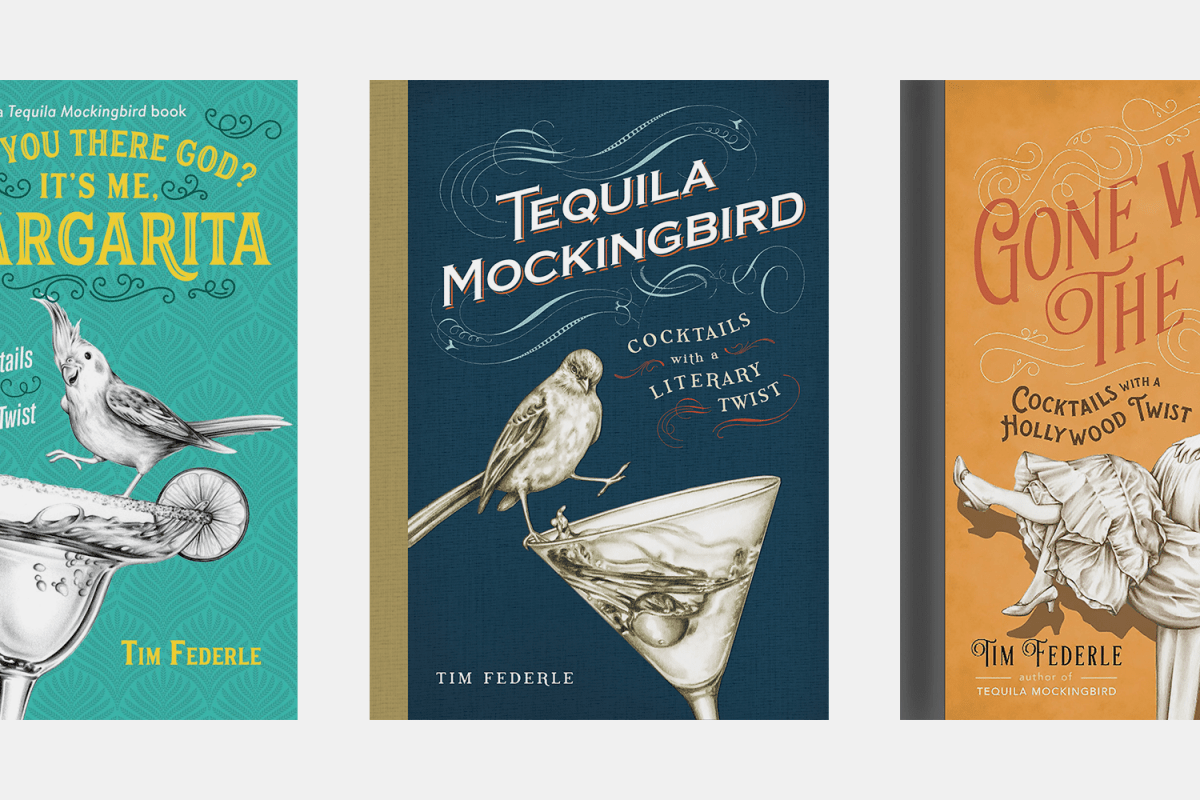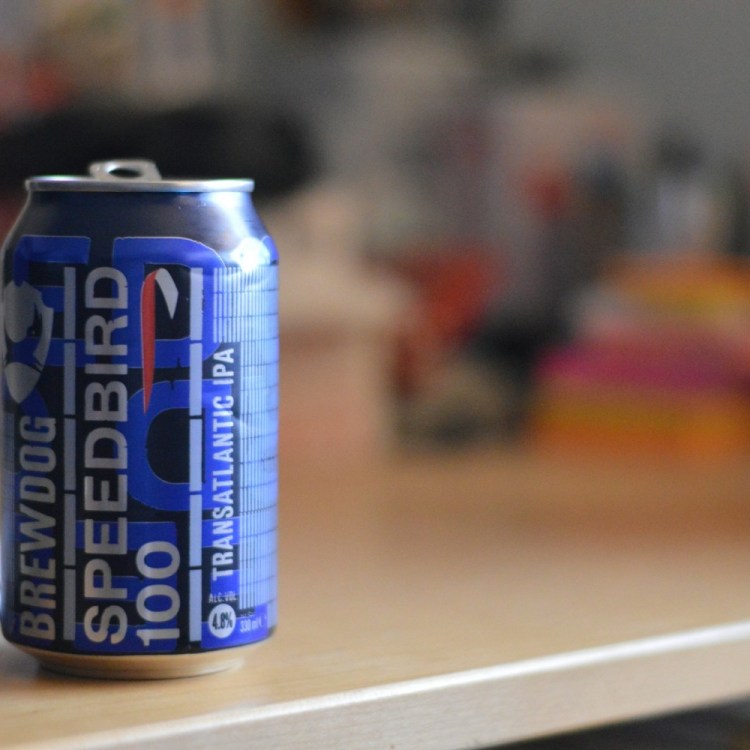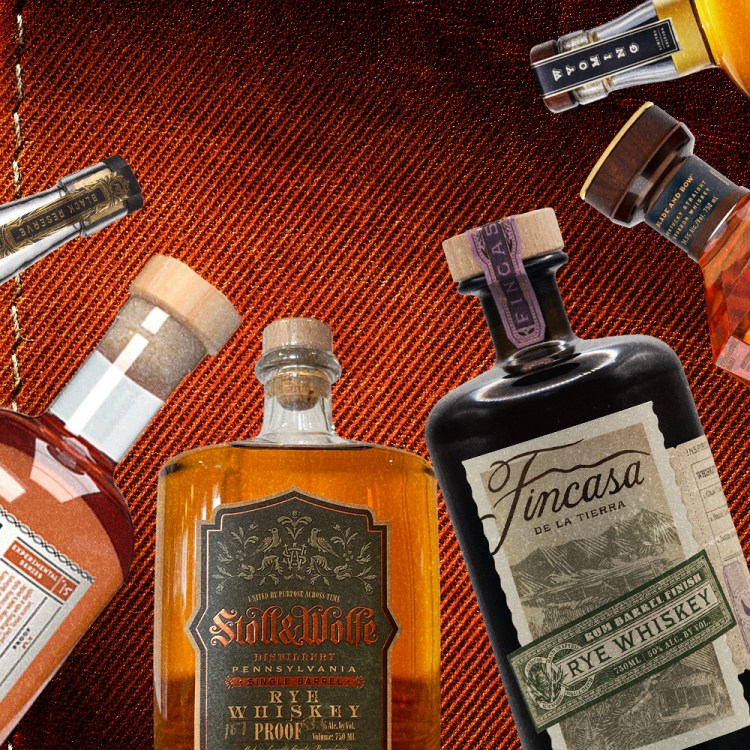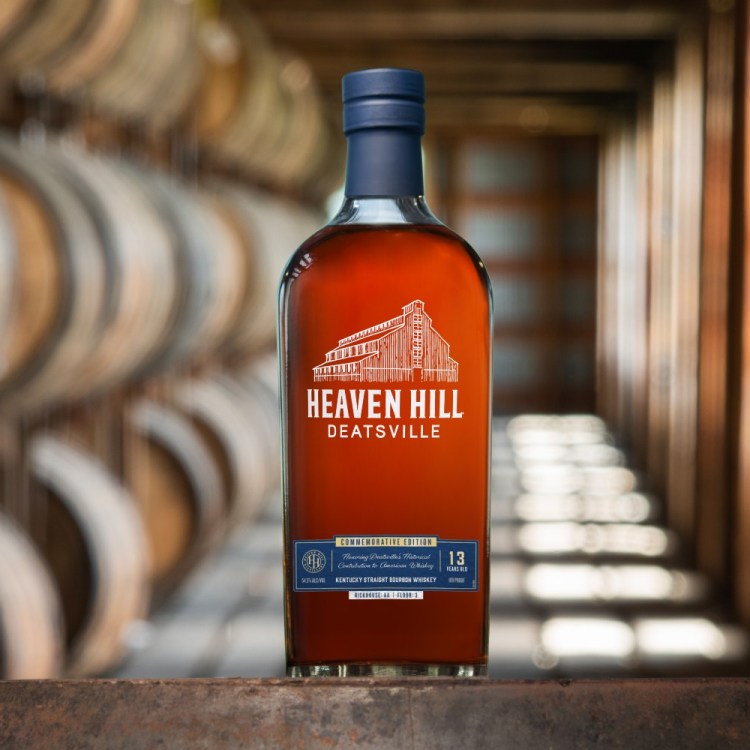As any author of a new book will tell you, at least once a day you go on Amazon to see how it’s selling. (Guilty.) And, if you’ve written a cocktail book any time in the past five years, every time you go to Amazon you’ll see a series of cocktail books totally kicking your ass.
Released in 2013, Tequila Mockingbird: Cocktails With a Literary Twist is a book of drink recipes purely based on, well, dumb puns. Written on a whim by a Broadway actor and animation screenwriter with no drinks-industry background, Tim Federle, the book has sold so remarkably well it has created an entire cottage industry, from miniature editions to cocktail kits to a children’s book to two sequels: Gone With the Gin (2015) and Are You There God? It’s Me, Margarita (2018). All three books are now usually the three best-selling cocktail books at any given moment on Amazon … and the cocktail world detests them.
“I think at the very least his books are annoying,” believes Sam Slaughter, food and drink editor at The Manual.
Admittedly, even from the book’s opening line — “An English major walks into a bar…” — it’s evident this book of “scholarly sips for word nerds” is not meant for the cocktail cognoscenti whose shelves are stocked with geeky tomes by David Wondrich and Robert Simonson. In this self-described “SparkNotes with a liquor license” you are not going to find, say, advanced techniques for clarifying milk punch or fat-washing whiskey; instead, you’re going to find the most basic of mixed drinks, the only thing unique about them being that their names have been made into a literary pun.
“My mother had a book club that would dissolve into opening wine. This was a tribute to my mom, born as a joke,” Federle told a Tampa crowd in 2014, even noting that coming up with the cocktail titles was pretty easy. Wrote The Atlantic, “Federle’s process seems simple: He compares two lists, one of famous drinks and the other of the works he’s referencing.”
Thus, The Turn of the Screwdriver is a Screwdriver: OJ and vodka. The Joy of Sex on the Beach is nothing more than a Sex on the Beach: vodka, peach schnapps and pineapple juice. The Pitcher of Dorian Grey Goose is a can of frozen lemonade mixed with a bottle of vodka.
“His recipes are, more often than not, just classic recipes that he’s renamed,” claims Slaughter, mockingly noting that “an orange is still an orange even if you decide to call it a ‘sun ball sweet fruit.’” Despite their simplicity and obviousness, Federle still enlisted the help of a “cocktail consultant” to produce them — they still don’t manage to impress the cocktail community at large, both behind the bar and on the internet.
“This book would be a great gift for an English teacher,” writes bartender Briana Carlson, in her one-star Amazon review of the book. “However, for anyone somewhat interested in cocktails it’s pretty worthless.”
Some times, the recipes don’t even make much sense, such as with Bridget Jones’s Daiquiri, a drink that doesn’t have the expected rum in it (or any spirit for that matter) and encourages you to inexplicably blend champagne. Other recipes are downright half-assed, like in the Postman Always Bring Ice, a glass of ouzo with Coke poured on top of it. The Tequila Mockingbird is one of the most slap-dash in the entire book — it’s merely a tequila pickleback shot.
“Coming up with a quippy name for a great new cocktail certainly adds to its staying power and even to its enjoyment so I do respect that,” writes another bartender in his one-star review.
“The problem is, when you come up with the name first and then try to make a cocktail that fits the name (rather than the other way around), it takes some skill and knowledge and facility with making drinks … The author just thought of a great title, then thought of a lot of great cocktail names based on literature, but then cobbled together a haphazard list of random ingredients and re-hashed existing old cocktail recipes with zero skill.”
Yes, if the entire success of the book hinges on its punny title, it should probably be noted that the titular drink is not even the world’s first “Tequila Mockingbird” cocktail. A recipe for something called the Tequila Mockingbird appears as early as Rob Chirico’s 2005 Field Guide to Cocktails: How to Identify and Prepare Virtually Every Mixed Drink at the Bar. An image of the drink shows a forest green cocktail adorned with an entire lime wheel, served in a distinctly early-aughts ‘tini glass. Its recipe is a simple combo of creme de menthe, lime juice and, of course, tequila. While the drink may have first been written down in the mid-aughts, Chirico traces his pun back to 1970 and a school dance.
“Being a lover of words and puns that I am, I had just finished reading To Kill a Mockingbird … [when] the band played ‘Tequila’ I quipped to a friend, ‘Tequila Mockingbird,’” he explains. He claims when writing the tequila cocktails section of his book, he recalled the joke and resurrected the pun. “I couldn’t say if Federle actually swiped the title — unless we subjected him to water torture or hours straight of watching Fox News.”
The esteemed Difford’s Guide notes that the cocktail was thought to be created “some time in the 1960s” — something I can find absolutely no proof of, especially considering the recipe they list is the exact same as Chirico’s. Nevertheless, that particular recipe seems to be in some sort of cocktail canon, even appearing in the recipes section on various brand websites, including Absolut’s (despite the fact it completely lacks vodka). Outside of the cocktail world, the Tequila Mockingbird pun has also appeared prior to Federle’s book as a 1977 jazz piano album, an Urban Dictionary definition (“Someone who, upon becoming intoxicated, attempts [poorly] to sing along to every song that plays around them”) and a Mexican restaurant in Australia with food that, surprisingly, looks pretty good.
Whatever the case, it should be clear that at least Federle didn’t first come up with the pun — as to whether he’d heard of those others, who knows? But, also, who really cares? Federle (who rarely gives interviews, and declined to talk to InsideHook) has a wildly varied career any content creator would be envious of. He’s performed on Broadway, written the young adult classic Better Nate Than Ever series, scripted the Golden Globe-winning animated movie Ferdinand, published a self-help book and is currently producing the new High School Musical TV series. Any writer, myself included, would be jealous that to learn that his cynical ploy to make money off bad puns actually worked.
“Hey, do you think the Urban Outfitters crowd would go for a literary cocktail guide?” he apparently asked his agent, something perhaps other cocktail book writers should be asking as our books are shoved in the downstairs cocktail book section at Barnes & Noble. Because Federle’s whim was actually right: Tequila Mockingbird would sell well over 100,000 copies in its first year on shelves and continues to sell remarkably well to this day.
“Because of its ubiquity, when I first pitched my book idea to my agent, I told him that I wanted to do something similar, and do it better with better cocktails and better puns,” adds Slaughter whose book, Are You Afraid of the Dark Rum? and Other Cocktails for ’90s Kids, came out this past June.
If the insular cocktail world hates Tequila Mockingbird, average Joes and Janes continue to crush on it. In 2013 it won Goodreads’ readers-voting book-of-the-year “Choice Award” as the best cookbook, destroying runners-up from the Pioneer Woman, Michael Pollan and Gwyneth Paltrow. It’s exceedingly popular on Instagram, too, with more than 15,000 hashtags at the time of this publication. It has long been firmly entrenched as the “most-gifted” cocktail book on all of Amazon. There’s simply not stopping its runaway success, haters be damned. And perhaps that’s why many cocktail experts have come to accept it, if not begrudgingly admire it.
“My guess is that it’s a huge success because it’s friendly, un-intimidating — a perfect sort-of-jokey gift for someone who isn’t necessarily a cocktail nerd,” says Maggie Hoffman, author of One-Bottle Cocktail and Batch Cocktails. “Its success is probably a worthy reminder to the rest of us to stop taking ourselves so seriously.”
Every Thursday, our resident experts see to it that you’re up to date on the latest from the world of drinks. Trend reports, bottle reviews, cocktail recipes and more. Sign up for THE SPILL now.
























